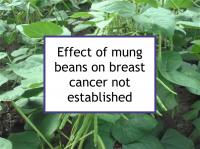Mung beans are the seeds of the legume Vigna radiata (also known as Phaseolus radiatus, Phaseolus aureus, or Phaseolus mungo - all are names for the same plant). Mung beans are a good dietary source of gallic acid and folate, and also contain several other B vitamins, as well as coumestrol, fiber, iron, magnesium, and manganese.
Mung beans have been shown to have antioxidant, anti-inflammatory, topical anti-inflammatory, antiproliferative, hepatoprotective, antimicrobial, antifungal, antibacterial, diuretic, and hypoglycemic actions, as well as improving cholesterol levels. The flavonoids vitexin and isovitexin are believed to be responsible for some of the antioxidant and topical anti-inflammatory properties of mung beans. The protease inhibitor mungoin has been shown to be responsible for some of the antifungal and antibacterial activities of mung beans.
Cancer-related effects of eating mung beans
In one study of 66 plants and vegetables commonly consumed in Japan, boiled extracts of beans, including mung beans, were among the food groups found to have the greatest anti-tumor-promotion and radical-scavenging activities. Consumption of mung bean pancake was shown to reduce the risk of stomach cancer in one Korean study.
One study of the estrogenic effects of various legumes found that mung beans did not increase proliferation of human breast cancer cells. However, another study found that mung bean sprouts did increase proliferation of human breast cancer cells.
Gallic acid has been shown to increase the effectiveness of paclitaxel chemotherapy in hormone receptor positive (ER+/PR+) breast cancer cells.
Additional comments
Mung beans, also known as moong beans, are often referred to as "green beans" in Asian and South Asian cuisines. For example, they are used to make the dessert Green Bean Soup. Mung bean paste is used similarly to red bean paste in Chinese cuisine and can be a good substitute for red bean paste (i.e., adzuki bean paste). Mung bean starch is used to make transparent glass noodles. Mung bean sprouts are the sprouts typically used in sprout-based stir fry dishes in Chinese and other Asian restaurants in the U.S.
Non-Asian U.S. consumers typically purchase and consume mung bean sprouts rather than mung beans themselves. Outbreaks of salmonella or E. coli infections linked to bean sprouts occur from time to time. Consumers of bean sprouts should stay aware of and act upon any such reports. Alfalfa sprouts (which are sprouts of Medicago sativa, a pea family plant) have also been linked to a number of food-borne disease outbreaks.
Sources of information provided in this webpage
The information above, which is updated continually as new research becomes available, has been developed based solely on the results of academic studies. Clicking on any of the underlined terms will take you to its tag or webpage, which contain more extensive information.
Note that while we are continually searching for new evidence specifically concerning mung beans, there is not much interest in it among breast cancer researchers, so few studies that focus on this food are available.
